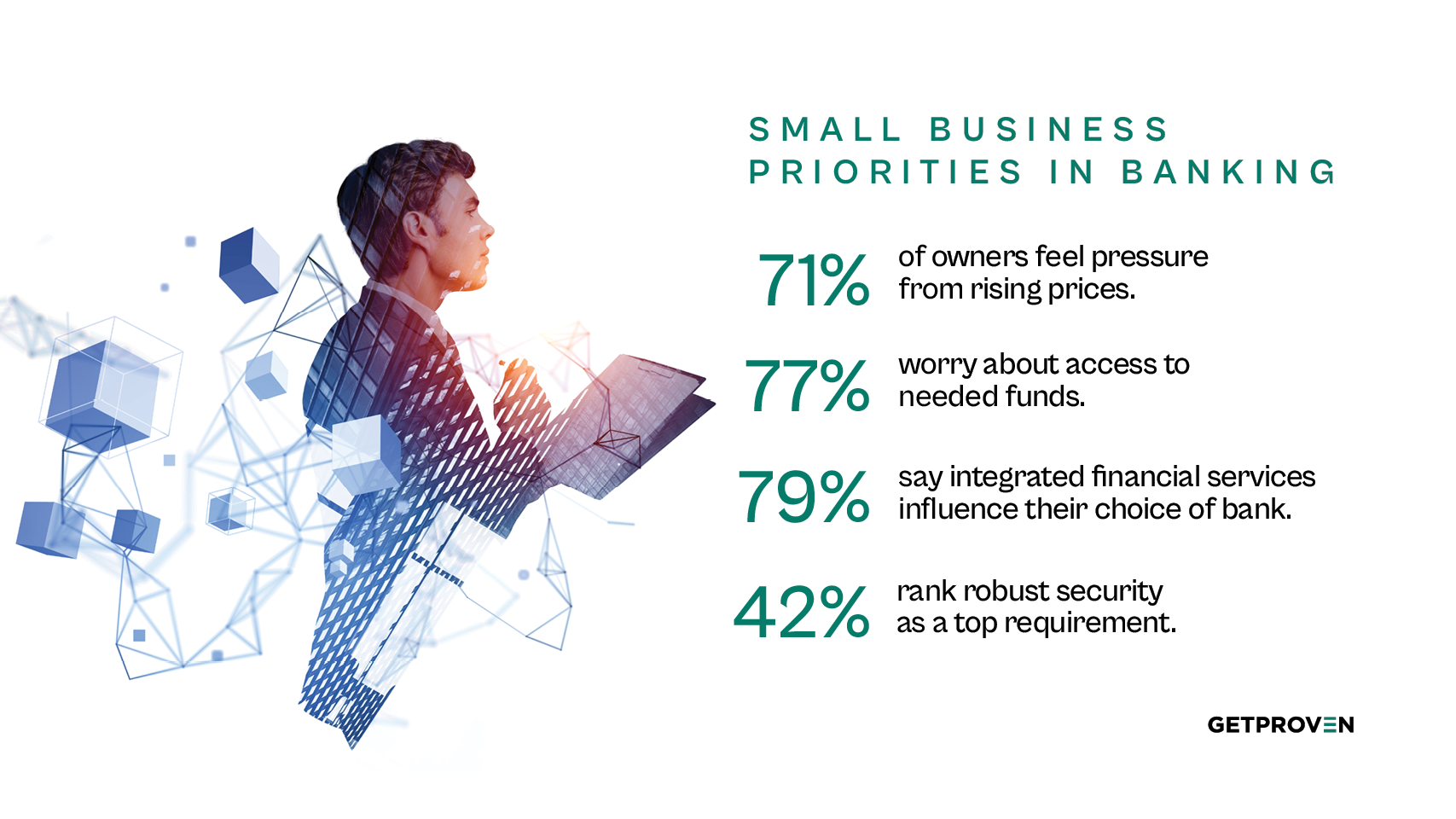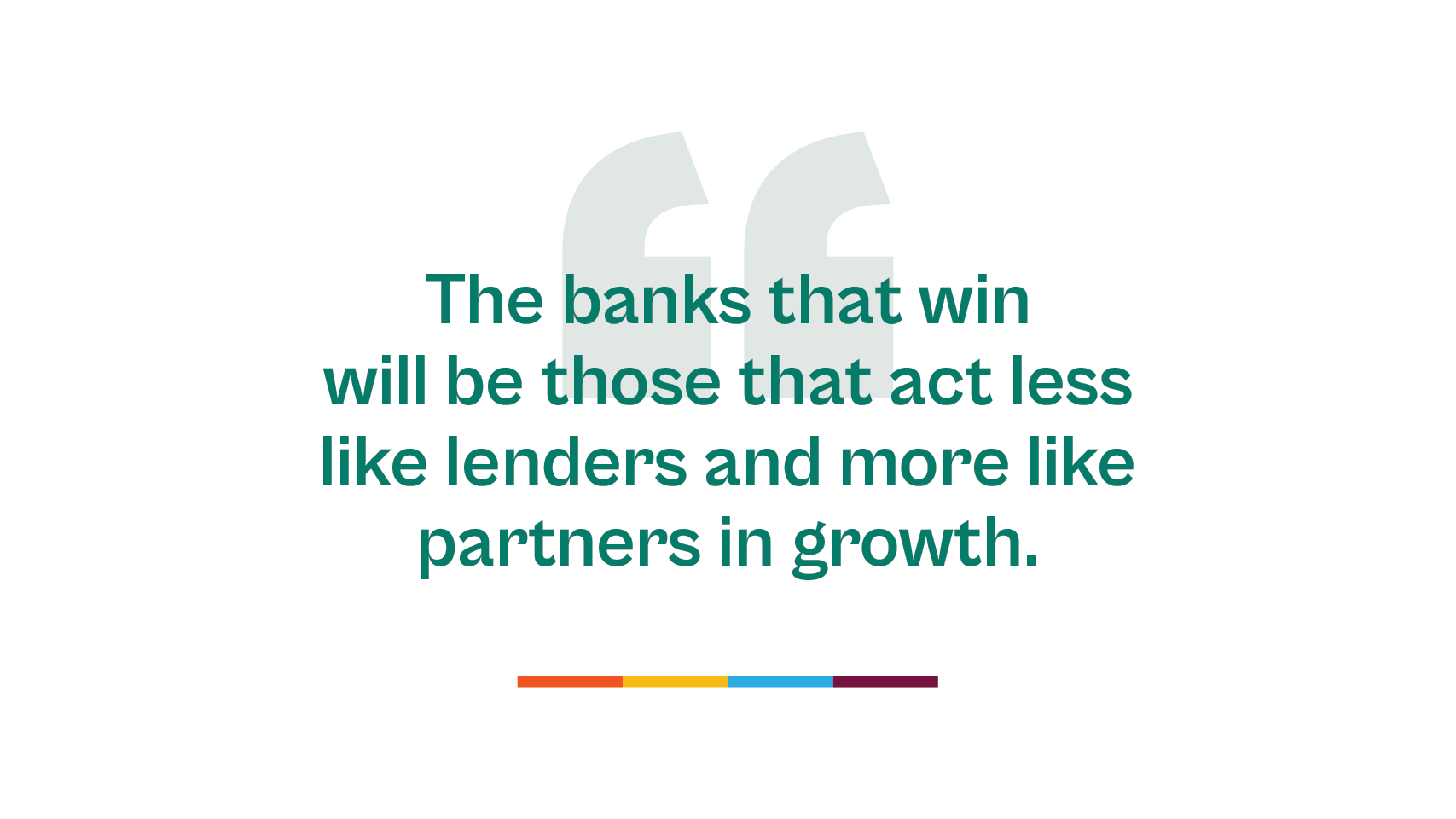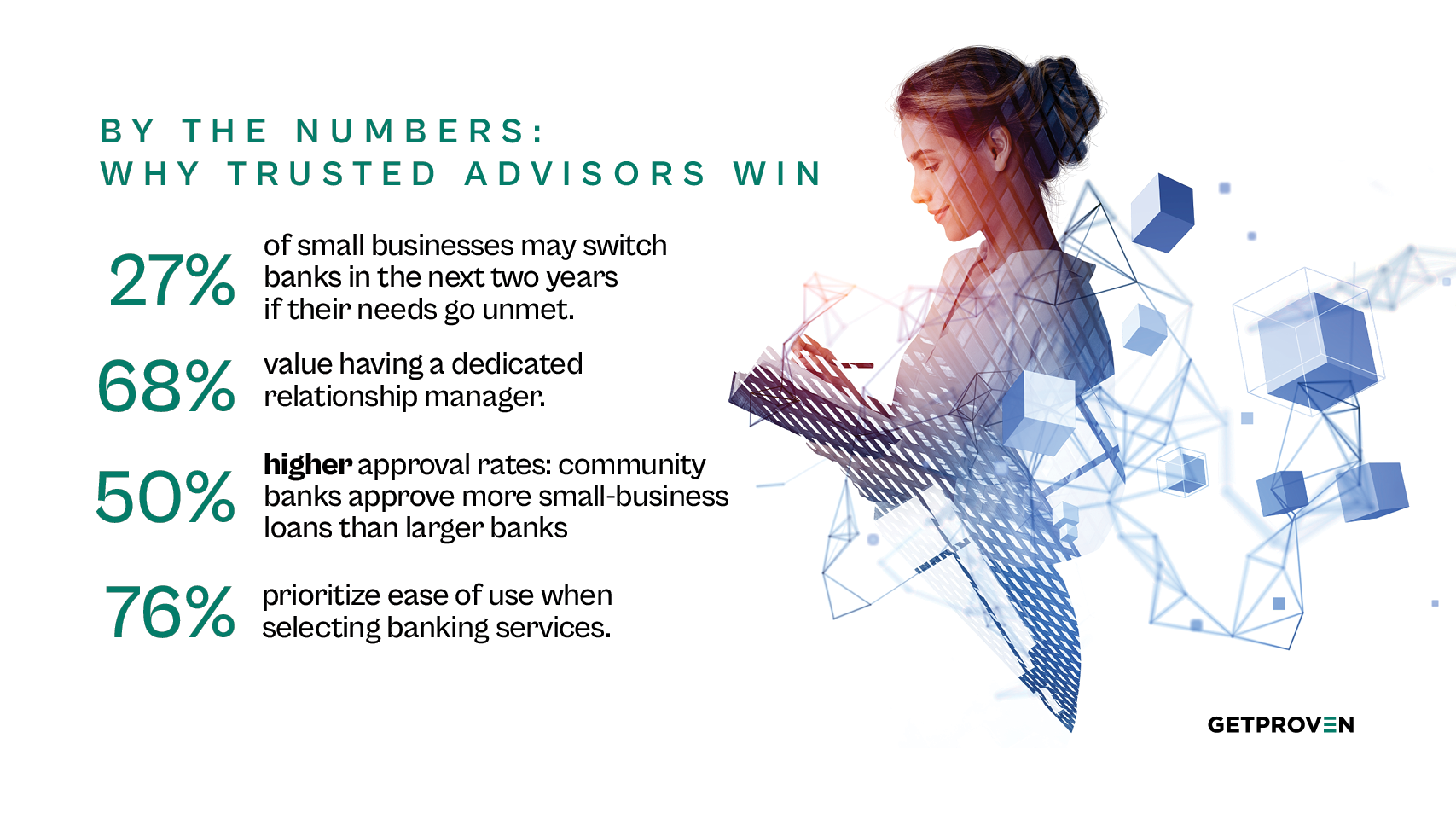
How Banks Can Become Trusted Advisors to Entrepreneurs

For years, many small business owners have viewed their banks as little more than places to hold deposits, process payments, or apply for business loans. Yet today’s small businesses face increasingly complex challenges. From cash flow management to navigating rising costs and new technologies, they want a banking partner who can do more than provide traditional banking services.
This creates a significant opportunity for community banks, credit unions, and other financial institutions. By stepping beyond transactions and becoming true advisors, they can build stronger long-term relationships, retain existing ones, and attract new small business clients who are actively seeking better support.
Becoming a trusted advisor doesn’t mean reinventing the bank. It can start with small, practical steps, like providing access to vetted resources through a platform such as Proven, which gives small businesses the support they need while positioning the bank as more than just a financial provider.

Why SMEs Need More Than Products
Running a business is harder than ever. Rising costs, tight margins, and access to capital are constant struggles for the small business sector. Surveys show that over 70% of business owners are concerned about maintaining access to funds, and more than a quarter say they might consider changing banks if their needs aren’t met.
The issue isn’t just about interest rates or competitive rates on small business loans. It’s about whether banks are providing the right resources for day-to-day survival and long-term success:
- Cash management services that simplify day-to-day operations.
- Integrated digital tools like online banking, mobile apps, and even Google Pay that make banking intuitive.
- Access to treasury management, merchant services, and payroll services that keep business funds flowing smoothly.
Entrepreneurs don’t want to juggle multiple providers for each of these needs. They want a primary financial institution that understands their specific business needs and can bring everything together.
What It Means to Be a Trusted Advisor
Becoming a trusted advisor goes far beyond offering small business banking products. It’s about building genuine relationships with small businesses where the bank is seen not just as a lender, but as a reliable partner who understands the realities of running a company.
For a business owner, that trust can make the difference between staying with their primary bank or exploring alternative lenders.
Research shows that 68% of small businesses value having a dedicated banking relationship manager, and those with advisors are significantly more likely to believe their bank acts in their best interest. That’s important, because “acting in a business’s best interest” accounts for nearly a third of how small businesses measure trust in their bank.
In other words, rates and features matter, but trust and guidance carry more weight in creating loyalty.
What Trusted Advisors Do Differently
- They tailor, not generalize. Instead of pushing generic loan products, advisors offer tailored financial solutions that fit the specific business needs of each client—whether that’s an SBA-backed loan for a startup, a line of credit for seasonal cash flow, or equipment financing for expansion.
- They anticipate needs. A trusted advisor uses client history and customer insights to spot issues early, like flagging potential cash flow management gaps before payroll comes due or suggesting treasury management tools as revenue grows.
- They educate. Many small business owners don’t have formal financial training. Advisors who offer workshops, webinars, or one-on-one guidance on topics like budgeting, tax planning, or working capital aren’t just selling—they’re equipping clients with the knowledge to make better decisions.
- They align actions with interests. Trust is reinforced when banks demonstrate they are looking out for the business, not just the bank’s balance sheet. That could mean steering a client away from a loan they don’t need, or recommending outside resources when it’s in the client’s best interest.
An Example in Practice
Imagine a family-owned bakery that struggles every winter when foot traffic slows and holiday expenses rise. A typical bank might simply process their loan request or deny it based on seasonal revenue fluctuations.
A trusted advisor, however, would take a different approach. They might work with the owners to project cash flow, set up a short-term line of credit for working capital, and introduce digital tools to track daily business funds more effectively. They could also suggest merchant services for online ordering, helping the bakery smooth out revenue during slower months.
For the bakery, the difference is undeniable: one bank just handles transactions, while the other becomes a true partner in helping them thrive.
Why It Matters
Small businesses often juggle multiple financial institutions to meet different business needs—a trend driven by gaps in service. By acting as a trusted advisor, banks can consolidate those relationships, becoming the first call for everything from payment processing to financial tools to vendor management. This doesn’t just increase wallet share it creates long-term relationships that anchor the bank in the heart of the local economy.

Practical Ways Banks Can Earn SME Trust
Earning the trust of small business clients doesn’t happen through one product or policy change; it’s the result of consistent actions that show commitment to their success. For many small businesses, the deciding factor in whether to stay with their primary bank or explore alternatives is whether their financial partner feels proactive, reliable, and genuinely invested in their growth. That trust can be built in a variety of ways.
The following strategies illustrate how community banks and credit unions can move beyond transactions to deliver the kind of value that keeps entrepreneurs engaged for the long term.
1) Offer Integrated Support
Small business customers expect more than savings accounts and business checking. They need tools that integrate into their day-to-day operations. A bank that provides seamless cash management services, payment processing, and connections to accounting software isn’t just delivering services; it’s helping businesses thrive.
For banks, building this kind of ecosystem from scratch can be costly and time-consuming. That’s why many are turning to platforms like Proven, which make it simple to offer integrated tools and resources. By doing so, banks can quickly deliver everyday value to small businesses while strengthening their role as trusted partners.
Illustration: Consider a local landscaping company juggling invoices from dozens of clients each month. Without integrated payment processing, their admin team spends hours reconciling payments and chasing down errors.
A bank that offers a bundled solution with invoicing tools, remote deposit capture, and payroll integration doesn’t just make life easier; it saves the business owner time and reduces stress. Suddenly, the bank is more than just a lender; it’s an integral part of the company’s day-to-day operations.
2) Provide Tailored Guidance
Every business is different, and so are its financial needs. A startup may need SBA-backed loans or short-term credit to get off the ground, while a mature company may be looking for treasury management, new digital tools, or funding to expand into new markets.
Simply offering a standard set of products isn’t enough. Business owners want to feel that their bank understands the specific business needs driving those requests.
This is where personalized financial guidance makes the difference. By sitting down with the clients, learning the rhythms of their cash flow, and understanding their growth plans, banks can shape tailored financial solutions that solve real problems.
That might mean structuring repayment schedules around seasonal sales cycles, bundling cash management services with a loan, or pairing a credit facility with merchant services to ensure smoother day-to-day operations.
When banks move from product pushing to problem solving, they signal to small business customers that they’re committed to more than transactions. They’re invested in helping each business thrive and that commitment is what turns a one-time borrower into a long-term client.
3) Empower with Education
Community banks have long excelled at personal service, and they can build on this by providing financial literacy programs for small business owners. Workshops, webinars, or even simple guides on managing cash flow or accessing business loans equip entrepreneurs with the right resources and strengthen their trust in the bank.
Illustration: Picture a new café owner who knows coffee inside and out but struggles to forecast expenses.
A bank that hosts a short workshop on cash flow management and provides one-on-one follow-up helps that owner avoid common pitfalls like underestimating payroll costs or overstocking supplies. The guidance might seem small, but it positions the bank as a trusted teacher and resource, not just a place to deposit the day’s earnings.
4) Leverage Digital Tools
Ease of use has become a major factor in banking decisions. In fact, more than three out of four small business owners say usability is one of the top drivers when choosing their banking services. For them, convenience isn’t a luxury; it’s an expectation shaped by everyday experiences with mobile apps, payment platforms, and online marketplaces.
That’s why investing in modern digital banking tools is no longer optional. Secure, intuitive online banking portals, streamlined mobile apps, and features like integrated payment processing or digital invoicing give business owners the ability to manage their day-to-day operations on their own terms.
Beyond convenience, these tools offer peace of mind by protecting sensitive business funds and providing clear, real-time visibility into accounts.
Banks that deliver this kind of seamless digital experience position themselves as forward-thinking partners rather than outdated providers. Just as important, they signal to their small business clients that the bank understands what it takes to operate in today’s fast-moving, digital-first business world.
The Benefits of Becoming a Trusted Advisor
The payoff for banks that embrace this role is both financial and relational. When small business customers feel understood and supported, their behavior changes in ways that directly strengthen the bank’s position.
- Deeper relationships mean more business. SMEs that trust their bank are far more likely to consolidate their accounts, loans, and financial services under one roof. Instead of spreading their business across multiple financial institutions, they choose one primary financial institution to handle it all. That creates efficiencies for the client and greater share of wallet for the bank.
- Loyalty reduces costly churn. Research shows that 27% of small businesses are considering switching banks in the next two years due to unmet needs. But when banks demonstrate alignment with client interests (through personalized services, tailored support, and proactive outreach), that risk shrinks dramatically. A loyal client is less swayed by competitive rates from a rival or the promises of alternative lenders.
- Trust creates referrals and community impact. Entrepreneurs are deeply connected within the local economy. When one business feels supported, they share that experience with peers—driving organic referrals and reinforcing the bank’s reputation as a true banking partner. The effect multiplies, contributing to local economic growth and strengthening the bank’s role in the community.
Community banks, in particular, are well-positioned here. With a 50% higher small-business loan approval rate than larger banks, they already hold an advantage in meeting the needs of local businesses. By pairing that strength with a consultative, advisor-focused approach, they can create long-term value for both their clients and their communities.

Wondering How To Get Started?
Shifting from service provider to trusted advisor doesn’t require a massive change. These are the first few steps you can take:
- Launch integrated offerings that assist with small business administration headaches.
- Train staff to provide tailored solutions and proactive outreach.
- Offer SBA-backed loans alongside education on how to use them effectively.
- Introduce curated platforms like Proven to connect clients with payroll, accounting, and vendor resources quickly.
Each of these steps demonstrates to clients and prospects alike that your bank is committed to their growth.
Conclusion
In the current financial landscape, small businesses tend to gravitate toward institutions that can offer tools, guidance and solutions that help them deal with business operations.
The trusted advisor role is an untapped opportunity that is perfect for local and more SME focused banks. Banks supporting small businesses through tailored guidance, and secure digital experiences will grow beyond transactions to build loyalty with their customers that lasts.
And with solutions like Proven, it’s easier than ever to provide curated resources that help entrepreneurs thrive while positioning the bank as more than a financial provider.
Curious to see Proven in action? Learn more here.



.png)




.png)





